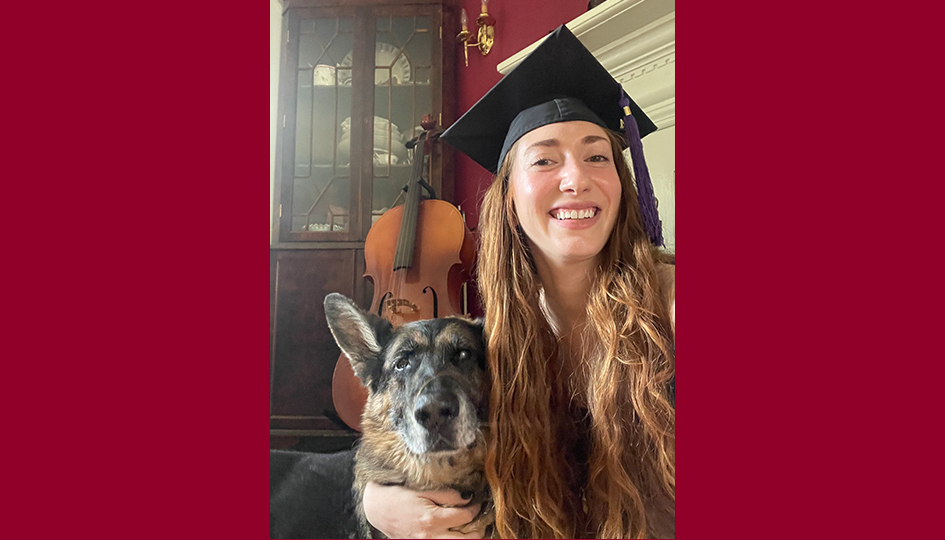Miriam Ambrosino, FCLC ’17, was selected as one of 10 graduate fellows chosen from 60 finalists to join the program. The fellowship provides three years of funding to Ph.D. candidates, who will be conducting research and exploring pedagogy while teaching undergraduates.
Ambrosino will be pursuing her Ph.D. in philosophy at Stony Brook University this fall after completing her master’s at New York University. She began her studies at Fordham as a pre-med philosophy major and credits the University with guiding her toward a multidisciplinary path in her graduate studies. Her ultimate goal is to undermine racist and anti-feminist thinking by combining philosophy with literary criticism.
“She plans to teach philosophy and she very much sees it as a way of helping students to live fuller lives and to think about the larger dimensions of their lives, so she’s everything you could ask for in a Lilly Fellows candidate,” said Harry Nasuti, Ph.D., professor of theology, who has successfully shepherded several winning graduate candidates from Fordham through the process.
The newly selected fellows will meet at an inaugural conference in Holland, Michigan, this August with faculty mentors Martha Eads, Ph.D., professor of English at Eastern Mennonite University, and Charles Strauss, Ph.D., associate professor of history Mount St. Mary’s University. Following the conference, the fellows will begin a long-distance colloquium, engage in one-on-one mentoring relationships, and participate in three additional conferences.
Ambrosino said that the program will be like taking an extended course that will allow her to collaborate with like-minded humanities scholars from other disciplines, such as art, literature, and theology.
Nasuti said that Ambrosino’s fellowship reflects larger institutional values at play.
“Part of Fordham having philosophy in the core curriculum is a statement that there are certain larger things that students need to be considering in their lives,” said Nasuti. “And so, it certainly says something good about Fordham that we have a student like Miriam, who wants to continue that mission into the next generation.”
For her part, Ambrosino said it’s precisely because of Fordham’s interdisciplinary approach to education, and the liberal arts in particular, that she became interested in studying philosophy.
“I was thinking a lot about the Ignatian values in my undergraduate degree and thought, ‘How can I use this?’” she said. “Broadly speaking, now I combine philosophy with reader-response theory, where I think about the relationship between the reader’s response to a text and the cultural restraints of the text, as well as the author’s intentions.”
She added that the readers’ response experience helps foster contemplative practices similar to those found in the Ignatian spiritual exercises.
“It’s a starting point of dialogue about our own habits of how we perceive others so that white scholars can go about reading the texts by people of color in ways that check our biases,” she said. “In other words, how do white scholars read a text by a scholar of color and not screw it up? How can we do make these changes within academia and listen appropriately?”
She said exposure to a variety of subject matter allowed her to connect seemingly disparate concepts. Combining literary theory with philosophy was a concept she learned from Shiloh Whitney, Ph.D., associate professor of philosophy at Fordham.
“She the reason I’m getting all of this, I took her twice and came back to take her as a graduate student on critical phenomenology,” she said, referring to the practice of interrogating conditions, institutions, and assumptions that structure lived experiences. She was able to study with Whitney while pursuing her master’s degree at New York University’s Gallatin School for Individualized Study.
“I like that she’s a white female philosopher who foregrounds social justice in her academic work.”
Last summer, she said, the murder of George Floyd made her combined course of study all the more imperative.
“I began to think about what my role is as a white philosopher in the academy. And what would my work be if I were to get a Ph.D.?,” she recalled. “The Lilly Fellowship will allow me to take that course of study even further and integrate my Ignatian values so I can build upon contemplation in action.”

